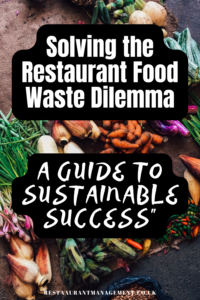Reducing Restaurant Food Waste
In the dynamic world of restaurant management, a dual commitment to profitability and sustainability has become paramount. Every culinary visionary recognizes that success isn’t just measured in taste and ambience but in the conscious efforts to minimize waste and environmental impact. Enter the formidable realm of Restaurant Food Waste Management, an often-underestimated challenge that can transform not only your bottom line but the essence of your establishment. This is a journey into the heart of this culinary problem, offering an array of actionable strategies, expert insights, and pragmatic tips that will empower you to reduce waste, enhance your restaurant’s financial stability, and contribute to a greener future.
The significance of Restaurant Food Waste Management cannot be overstated. It’s not merely a matter of disposing of unserved meals but a multifaceted concern that touches upon economic viability and ecological responsibility. Startling statistics reveal that, in the vibrant hospitality sector of the UK alone, an astonishing 4.1 million tonnes of food are squandered annually, inflicting substantial financial losses while casting a glaring shadow on environmental sustainability. In a world increasingly attuned to ecological consciousness and financial acumen, tackling this challenge head-on is an option and imperative for any restaurateur with an eye on the future.
Every restaurateur understands the importance of both profitability and sustainability. Let’s look into actionable strategies, tips, and insights to help you minimise food wastage in your restaurant and gain a competitive edge.

Understanding the Impact of Food Waste
In the restaurant industry, one cannot overstate the significance of food wastage. It poses an economic concern and contributes significantly to environmental issues. Research reveals that in the UK’s hospitality sector alone, approximately 4.1 million tonnes of food go to waste yearly, incurring substantial financial losses for businesses.
Sources of Food Waste
Preparation Waste
A significant amount of food waste occurs during preparation due to inefficient cutting, peeling, and trimming processes, contributing to avoidable wastage.
So, kitchens should fine-tune these processes to improve efficiency. McDonald tracks their food waste on a two-hourly basis and it is reviewed daily and weekly to evaluate the impact on their Food Cost.
Plate Waste
Another substantial contributor to restaurant food waste is uneaten food on customers’ plates. Understanding portion control and catering to customer preferences is vital. Offering flexible portion sizes can help reduce plate waste significantly, aligning servings with varying appetites.
Spoilage
Inadequate storage or poor rotation of inventory can lead to spoiled food items. Effective inventory management is essential to mitigate this issue. Implementing a “First-In, First-Out” (FIFO) inventory system ensures that older items are used before newer ones, reducing the risk of spoilage. Proper labelling, including expiration dates, is critical to prevent confusion.

Practical Measures for Minimising Food Waste
Menu Planning
Effective menu planning strategies can go a long way in reducing food waste:
- Offer Flexible Portions: Restaurants can significantly minimise plate waste by providing various portion sizes to cater to different appetites.
- Daily Specials: Creating specials that utilise ingredients nearing expiration date reduces waste and offers unique, limited-time options.
- Menu Rotation: Regularly changing the menu helps prevent overstocking and spoilage while keeping offerings fresh and appealing.
Staff Training
A well-trained staff can make a substantial difference in curbing food waste:
- Portion Control: Training kitchen staff to adhere to portion control guidelines ensures that food is served in optimal quantities.
- Waste Awareness: Educating the team about food waste’s financial and environmental impact fosters a culture of responsibility and efficiency.
Food Storage
Efficient food storage practices are essential for reducing spoilage:
- FIFO (First-In, First-Out): A FIFO inventory management system guarantees that older food items are utilised before newer ones, thus minimising the likelihood of spoilage.
- Proper Labeling: Labelling items with expiration dates is crucial to prevent confusion and ensure they are used before they go bad.
Monitoring and Analytics
Leveraging technology and data analysis can significantly improve food waste management:
- Food Waste Tracking Software: Investing in software that tracks and analyses food waste data provides valuable insights to identify areas for improvement.
- Data-Driven Decision Making: Using data to make informed decisions about inventory and menu choices helps reduce waste while maximising efficiency.

Implementing Sustainable Practices
Sustainability is not only about reducing waste but also contributing to a better environment:
- Composting: Setting up a composting system for organic waste can divert significant waste from landfills.
- Donation Programs: Considering the donation of edible, excess food to local charities reduces waste and supports the community.
- Recyclable Packaging: Using eco-friendly, recyclable packaging for takeout orders reduces the environmental impact of restaurant operations.
Related Articles:
Best Restaurant Inventory Management System
How To Become A Restaurant Manager
The Benefits of Minimising Food Waste
Actively working to reduce food waste in your restaurant yields numerous benefits:
Cost Savings: Reducing food waste translates to cost savings and increased profits, enhancing the financial stability of your establishment.
Enhanced Reputation: Demonstrating a commitment to sustainability can attract eco-conscious customers, enhancing your restaurant’s reputation and customer loyalty.
Legal Compliance: By reducing waste, your restaurant can comply with food safety and environmental regulations, ensuring adherence to legal standards while contributing to a more sustainable future.

Conclusion
Minimising food waste in a restaurant is crucial to achieving financial stability and environmental responsibility. Embracing the strategies elucidated in this guide will not only bolster the success of your restaurant but also play a pivotal role in fostering a more sustainable future.
By adhering to efficient inventory management, staff training, and embracing sustainable practices, you can ensure that your establishment stands out as a beacon of excellence in the industry.
Frequently Asked Questions (FAQs)
- How can I measure the amount of food waste in my restaurant?
You can use food waste tracking software or conduct manual audits to measure food waste accurately.
- Are there any legal regulations regarding food waste in the restaurant industry?
Many regions have regulations to ensure proper food safety and environmental responsibility. It’s essential to comply with them.
- What are the benefits of donating excess food to local charities?
Donating excess food reduces waste and helps those in need, fostering goodwill in the community.
- How can I encourage my staff to be more aware of food waste?
Staff training programs and raising awareness about food waste’s environmental and financial impact can help
.
- Can reducing food waste also improve my restaurant’s bottom line?
Absolutely. Less food waste means cost savings and increased profitability, making your restaurant more financially stable.

